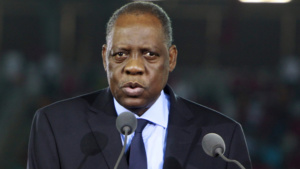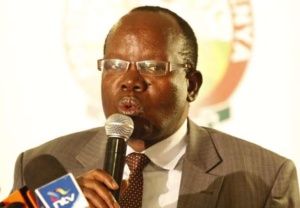While it was not exactly an easy win to have the hosting rights for 2018 African Nations Championship (Chan), it does appear that the hard won battle may not have been necessary as it looks like it could slip away from Kenya’s grip.

If reports emanating about the situation and preparation by the Kenyan Football Federation is anything to go by, then it would appear that preparations are quite behind in the current phase of report.

The Football Kenya Federation, then led by Sam Nyamweya, spent upwards of Sh50 million in 2013 to put together a bid and to facilitate frequent trips to and from Caf headquarters in Cairo to negotiate with African football chiefs.
Kenya’s bid, placed by Nyamweya’s office in 2013, was initially meant for the more prestigious Africa Cup of Nations (2017 edition), but a Caf Executive Committee meeting in Cairo on February 21, 2014 instead chose to give Kenya hosting rights for the less prestigious Chan.
Zambia had also placed a bid for this year’s Afcon alongside Kenya and lost, and the continental event was eventually handed to Libya before being moved to Gabon more than a year later due to political strife in Libya.
Zambia were allowed to host 2017 Africa Under-20 Cup of Nations, while Kenya delighted in the small but important achievement of winning the hosting rights for Chan.
At the time, Caf indicated that Kenya had won the right to host the second-tier African football event and not Afcon “so as to help Kenya test her ability to host such a tournament.”
Caf’s decision was based on past experiences with Kenya, a country that had (not once before) previously bid successfully for a major African tournament, only to pull out at the last minute as was the case with 1986 and 1996 editions of the Africa Cup of Nations.
Looking back in retrospect, one gets the feeling that Kenya’s journey to winning the Chan hosting rights perhaps began on a wrong footing.
It is now apparent that Kenya was more interested in hosting Afcon and not Chan, never mind the country’s slow pace of putting in place requisite infrastructure for hosting tournaments.
Another interesting thing is that Kenya’s first commitment letter to host Chan did not come from the president or from a high-ranking government official as is often the case with other successful countries.
The letter affirming Kenya’s commitment to host Chan was signed by former Sports Principal Secretary, Patrick Omutia, and Caf took issue with this as they felt it should have been written by a high ranking government official.
Nevertheless, the bid stood even after Nyamweya left office in a hotly-contested election in February last year, paving the way for Nick Mwendwa who was elected on a platform for change.
Shortly after assuming office, Mwendwa is reported to have made the bold declaration that he would resign if Kenya would lose out on the chance to host 2018 African Nations Championship.
At that time, it seemed impossible that Kenya would find itself in a tight corner with regard to its preparedness to host the tournament. First, the government had promised to construct five new state-of-the-art stadiums just a year and a half earlier.
Second, Mwendwa was widely regarded as the biblical messiah of Kenyan football, a man with the necessary connections and goodwill from the government.
Third, there were two full years before the start of the competition (it was 2016), giving him enough time to meet Caf’s guidelines and deadlines.
Fast forward to June 2017 and the issue of hosting Chan has evolved into something of a knife that the current FKF regime has to sleep with every night, its blades cutting deeper every day.
As it stands, out of the five stadiums meant to host the tournament (Meru’s Kinoru Stadium, Eldoret’s Kipchoge Keino Stadium, Nyayo National Stadium, Kasarani Stadium and Kenyatta Stadium in Machakos), only Kasarani and Nyayo can meet the minimum security and logistical specifications recommended by Caf.
Caf, whose representatives were in Kenya for inspection tour last week, have not officially taken away hosting rights from Kenya, but the country’s fate hangs in the balance.
The team that toured the stadiums last week in the company of Mwendwa openly voiced its displeasure with the pace of Kenya’s preparation at the end of their visits.
In fact, Caf’s second vice president, Omari Selemani who is also president of Democratic Republic of Congo Football Association, made it known to all that “we have a plan B”, which was a subtle warning that should have sent ripples through the country, but didn’t.
With six months before the January 11 kick-off, the fear that Kenya could be stripped of hosting rights has grown into a chorus of frustrations, more so from FKF office.
On the first day of the tour on Monday last week, Mwendwa, together with the Caf delegation, were furious after finding Kipchoge Keino Stadium in Eldoret many months behind schedule.
Kipchoge Keino was very much behind schedule it is feared it may have to be struck off the list of proposed venues for the event.
Mwendwa, in the company of seven Caf inspectors and representatives from the Local Organising Committee, found constructors still digging the foundation of the 20,000-seater spectator’s terraces. Construction of the VIP area was yet to begin.
When they got to the Kinoru Stadium, they were greeted by a tussle between Meru County government and the national government, with Governor Peter Munya refusing to acknowledge ever agreeing to the government’s help in constructing the facility contrary to such claims by Sports Kenya. The stadium has been rated as being only 55 per cent complete.
The Nyayo National stadium, which is the most commonly used sporting facility in Kenya at the moment, still requires two additional changing rooms, comfortable modern seats as well as revamping of the playing surface.
Kenyatta Stadium in Machakos, which was put on standby should any of the five stadiums fail to meet the requirements in good time, itself needs some renovation due to overuse of the pitch.
Moi International sports Centre, Kasarani, is the only facility that looks remotely ready. Apart from sparse grass and lack of adequate lighting necessary for floodlit matches, the stadium is relatively ready.
What Caf is contented with, according to the inspectors, is that the hotel industry, transport and manpower in Kenya is excellent and readily available. For his part, Sports Cabinet Secretary Hassan Wario has admitted that the government has been dragging its feet in committing funds to renovate the stadiums.
The government has only disbursed Sh200 million of the Sh2.7 billion budget proposed by the Local Organising Committee, a situation that has further frustrated efforts to get the requisite sporting infrastructure ready by January next year.
“Kenya really wants to host this tournament because football is loved by Kenyans. What we are awaiting is our financial year budgets which should be in place by next month. If Caf officials come back by November, they will find us almost ready,” Wario said on Saturday during a press conference at Kasarani attended by the Caf inspectors.
Even if Wario’s word could be taken for truth, puzzling questions still abound as to how any developing country can complete such a huge tasks within the four months preceding November.
Caf’s next inspection tour of facilities will be on August 20.
Morocco, Ethiopia and Cote d’Ivoire have already expressed serious interest in hosting the tournament, and are waiting in anticipation of news that Kenya has stripped of hosting rights.
Serious sanctions await Kenya should hosting rights be withdrawn for any reason, including hefty fines as well as lengthy bans from competing in the competition as was the case in 1996 when the hosting rights for the Africa Cup of Nations were withdrawn and handed to South Africa.








